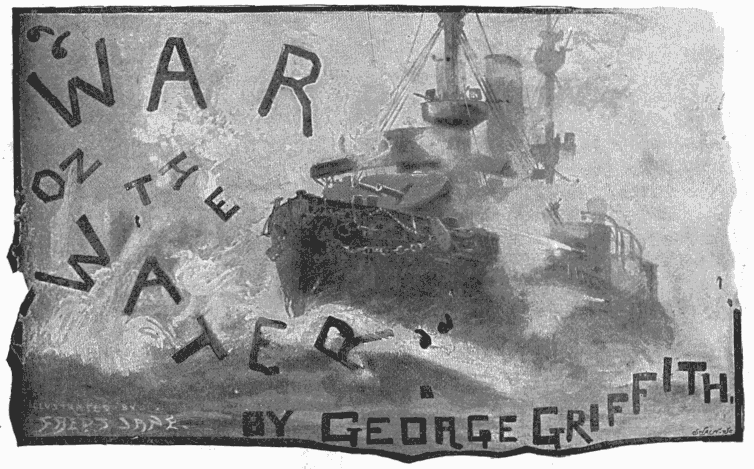

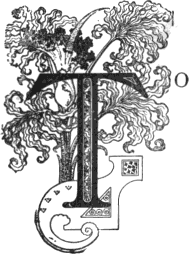
BEGIN with, and in order to make certain necessary matters quite plain to the reader, it must first be said that all which follows here is, in the nature of the case, little more than pure conjecture. Almost as well might a mail-clad knight of the sixteenth century, who had learnt the then unknightly art of using a pen, have sat down to write an essay on the effects of firearms in warfare, as may a man of to-day attempt to make an accurate forecast of the behaviour, offensive and defensive, of a modern battleship, either in a fleet action or a duel with an opponent of similar construction and fairly equal strength.
It has been well said by one who himself commands one of those almost miraculous combinations of destructive forces which we call battleships, that "the change from battle-axes and bows and arrows to firearms was not of a more revolutionary character as regards land warfare than is the change of the last fifty years from wooden sailing three-deckers, with their 32-pounder smooth-bore guns, to modern ironclads, as regards sea warfare."
Marvellous, mighty, almost miraculous, as the modern battleship is, she is neither more nor less than the realisation in steel and iron of an almost infinite number of experiments. Naval manoeuvres are all very well in their way, but only as a full-dress rehearsal of the grim tragedy of war, for there is not even so much likeness between the doings of the Red and Blue Squadrons and those of two hostile fleets meeting with the deadly intent to "burn, sink, and destroy," as there is between stage fencing with buttoned foils and a rapier duel to the death.
Then, again, the circumstances under which our hypothetical battleship is to go into action are, in the nature of the case, so varied that anything like a detailed consideration of all of them would form matter for a volume rather than a magazine article. There is the general fleet action — the Trafalgar or the Nile of to-morrow — the fight of the battleship supported by her attendant cruisers and torpedo boats against an enemy of similar force; the duel of battleship with battleship; the pitched battle by day; the stealthy night attack, and so on through all the hundred and one combinations that the chances of war might bring about, and of these only one can be chosen here, and that, as I have said, a purely imaginary one.
Let us, then, suppose that we are standing in the spirit — and may the kindly Fates fore-fend that either you or I should ever stand there in the flesh — on the navigating bridge of H.M.S. Hypothesis, a first-class battleship of the newest, and therefore, let us hope, the most formidable type, at the moment of the flying of the momentous signal, "Enemy in sight; prepare to engage."
We are steaming at ten knots in column of line ahead, that is to say, the ships are drawn out in a long line, each following the other, stem on, at a distance of two cables, or four hundred yards, from each other. The sea is smooth, and the sun is rising clearly on our port beam. The enemy has been sighted on the starboard bow, but all we can see of him from the bridge is a long, hazy-looking cloud of smoke, but our cruisers, the eyes and ears of our fleet, have been scouting all night, and the number and formation of the enemy are already pretty accurately known to the Admiral.
A new signal flies from the flag-ship, and the long line swings round in a vast curve until our bows point to the enemy and our sterns to the sun. This is the first point in our favour, not quite as great an one as the "weather gauge " was in the old sailing-ship days, but still one well worth having, for the enemy's marksmen will have the bright glare full in their eyes during the first of the firing, while ours will aim undazzled at brightly-lighted marks.
There is no clearing for action nowadays. Many hours ago the great fighting machine has been stripped of every superfluity that could interfere with the working of the guns, which now, as before, will begin and perhaps decide the fight.
Soon we hear the engines throbbing harder and the beat of the screws increasing in speedand power. The curling swirl of the water against the stem and over the deep-buried ram rises and broadens, and every moment the great ship forges faster and faster ahead, until, impelled by force equivalent to nearly 14,000 horse-power, she is rushing through the calm before the battle-storm at a speed of seventeen miles an hour.
Ere long, masts and funnels rise out of the water ahead of us, and we see that the enemy is disposed in columns of divisions in line abreast, that is to say, his ships are arranged in line along-side each other, and of these lines there are two. It thus chances that the two formations advocated by rival theorists are about to be submitted to the arbitrament of the gun, and perhaps of the ram and torpedo also.
At eight thousand yards the flagship just ahead of us makes a sweep to starboard. We and the rest behind us follow suit, and reluctantly obey the order to slow down to the speed of our slowest ship. So at fourteen miles our long curving line sweeps across the front of the enemy, drawing nearer to it, until a great cloud of white smoke, pierced by a pale flash of flame, bursts from the nearest enemy's forward barbette.
A mighty splash and a cloud of spray show where a great 800-pound projectile strikes the water some hundred yards short of our line, and the next we see is the shell skipping harmlessly away over the water across our bows. That is the sighting shot, and it tells us as well as the enemy that the time has come for the game of long bowls to begin.
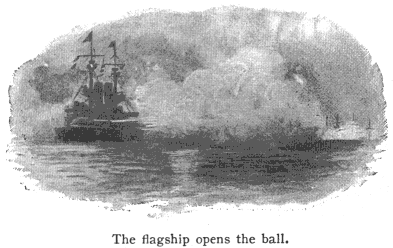
A second cloud of white smoke leaps from the forward barbette of the flagship, and the two sixty-seven tonners hurl their shells simultaneously into the midst of the enemy. A momentary flash far away tells us that one at least has found its mark, and that means that on something, armour or topwork or turret, the 800-pound mass of metal has struck with a force of some 40,000 foot-tons, smashing its way through and bursting somewhere with devastating effect.
Now comes our own turn. With a roar and a concussion which convulses the atmosphere about us and sends a shudder through the frame of the steel leviathan, two of our great guns speak at once. An instant after comes a sharp, short, screaming whistle, a shock and a crash, and a swift blinding blaze of flame. A shell has struck us almost squarely amidships, but the tough nine-inch plate has held good, and the shell has burst without penetrating. A few feet higher it would have pierced the thinner armour of the twelve-pounder battery with results that we scarcely care even to guess at.
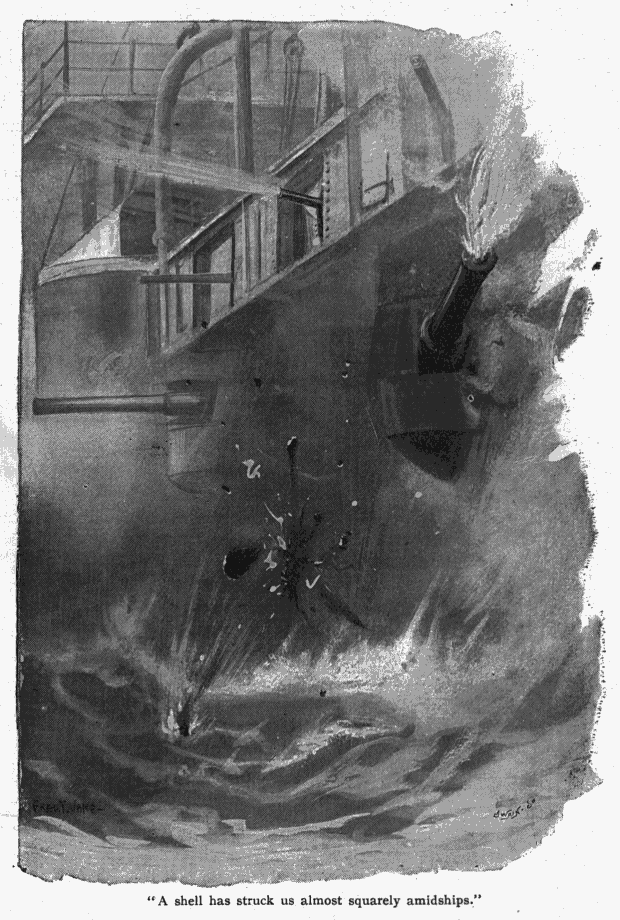
This is the first exchange of compliments, and now, ship after ship, we steam across the hostile front amidst vast drifting clouds of white smoke, the almost incessant thunder of the great guns, and the crash, and shock, and shudder that tell when a shell has found its mark.
But all the while the two fleets are nearing each other, and soon through the deeper thunder of the turret and barbette guns ring out the sharper and more swiftly succeeding reports of the quick-firers from the batteries.
This means that a storm of hundred-pound projectiles, a very tempest of death and destruction, is being hurled amongst the enemy at ever-decreasing range, and so fast and fiercely is that storm raging that three projectiles from each gun will be continually in the air for several minutes to come.
But the enemy is as well armed as we are, and out of the dense smoke bank which shows our gunners where he is, comes another storm as fierce, though not as deadly, since much of it passes through the gaps between the links of our long-drawn chain, and through this we steam on, battering and battered as ships have never been before since the first gun was mounted on shipboard.
All save ourselves have vanished from the deck. The Captain, with a Commander and two signalmen, is in the conning-tower, the little steel skull which holds the brain and directing will of the vast fighting organism. The gunners are in the turrets and in the batteries behind their walls and shields of armour. As for us, being where we are only in the spirit, it matters not where solid shot may strike or shell may burst, otherwise our condition would be parlous indeed.
As the range gets shorter, the awful din of the battle-storm grows louder and louder, and the hits come ever faster and more deadly, and at last the light armaments come into play. The harsh, sharp, grinding crashes and the thudding roar of the machine-guns swell the infernal chorus, and an incessant hail of lead and steel sweeps the ship from end to end, reducing to battered and shapeless ruin everything that is not protected by the solid armour of the sides and turrets and batteries. The funnels are riddled like sieves, boats are torn into splinters and swept in mere shreds of wood and rags of canvas out of the davits, and all on board now must sink or swim with the ship as a whole.
Suddenly a huge white form looms up through the drifting smoke only a few yards away on our bow. Happily for us, our two sixty-seven tonners are intact and freshly loaded. The turret swings round, and the muzzles of the guns sink down. The mingled blast of fire and smoke leaps from them, and sixteen hundred pounds weight of metal plunges at almost pistol range into the foe-man's side on the fore-quarter, where the armour is weakest. But no armour ever forged could have withstood the irresistible impact of that pointblank discharge. A great ragged hole gapes where a second before was the smooth white side; then, with a smothered roar, the great shells burst, the gash gapes wider, and a gush of flame and smoke pours out of it.
But almost at the same instant the guiding hand in the conning-tower has pressed an electric button. A long shining shape leaps from our side, then comes a dull roar, and a mountain of white foam and water leaps up under the side of the stricken ship. She stops and shudders, and then her proud bulk leans slowly over towards us.
One last crash of artillery thunders from her batteries, and just as our reversed engines drag us back, she rolls rail under, struggling for a few moments dumbly in the clutch of the waters that have claimed her for their own; and then her stern goes down, her bows flash in the sunlight, which gleams through a rift in the smoke, and, with a swift sliding plunge, she vanishes into the depths below.
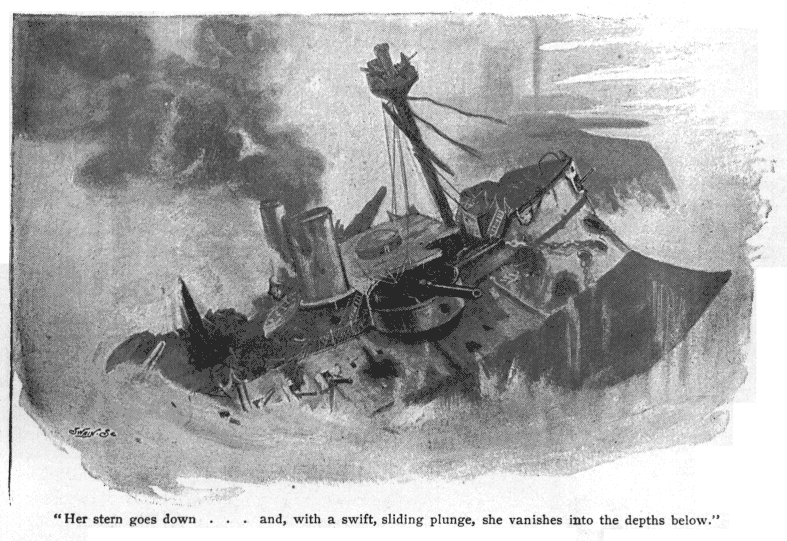
Then over her grave we forge ahead again, but now with diminished speed and feebler fire, for in the game of modern naval war, he who wins pays only a little less dearly than he who loses. To the landsman's eye the great ship which, but a few minutes ago, was so trim and strong and perfect, is now little better than a shot-shattered wreck, albeit, thanks to our good armour, and maybe to our better luck, her vitals are yet untouched.
The mighty engines are still smoothly exerting their colossal power, though our riddled funnels have somewhat reduced our effective steaming, but the sides and turrets and batteries, though gashed and scored and torn by the storm of shot that has rained upon them, are unpierced, and the guns behind them, with but few exceptions, are still workable.
So with every available gun loaded, and torpedoes ready to leap from the tubes on their errand of death, we sweep on to find a fresh antagonist. We have not long to wait, for the action has now become general, and it is a case of ship to ship till the last of the loser's craft has struck or sunk. The wind has freshened with the rising sun, and the smoke curtain rolls aside from such a scene of ruin as was never yet beheld upon the sea.
So far as we can see not a ship of either of the great fleets has passed unscathed into the zone of fire; not one but is battered and smashed almost beyond recognition; and, but for the flags still flying, some from the flag-staffs astern, some from signal yardarms, and some from stumps of masts and rims of fighting tops, it were hard to tell friend from foe. Yet the great guns are thundering on, the lighter artillery is roaring and flashing in incessant discharges, and still ship is seeking ship that she may destroy or be destroyed.
Right ahead of us a white leviathan is lying crippled. Perhaps a torpedo has struck her stern posts and wrecked her rudder and screws, for she is very much down by the stern, but the brave fellows on board her are working their guns manfully, and though she cannot run, she still can not only bark but bite.
Such a chance might not occur in a dozen actions, but here she is — a fair mark for the weapon which is the deadliest of all in modern warfare, if only it can be used. Deep down ahead of us, hidden by two fathoms of green water, is the terrible steel spur that has to strike but once, and behind it are the 12,000-ton dead weight of steel and the energy of the 14,000 horse-power engines, and now Leviathan must strike her flag or sink.
A message flashes up the wires from the conning-tower to the forward fighting top, and the signal "Will you surrender?" flutters up. For all answer Leviathan's after-turret swings round, and the guns belch out their flame and smoke and shot together. The next instant a great gash is torn almost from our bows to the forward casemate, and the long, projecting chase of one of our fore-turret guns seems to melt away. Then from the inside of the turret comes a half-smothered sound; a rush of flaming smoke bursts through the grating, and the other gun remains dumb, though the spark has been flashed that should have fired it.
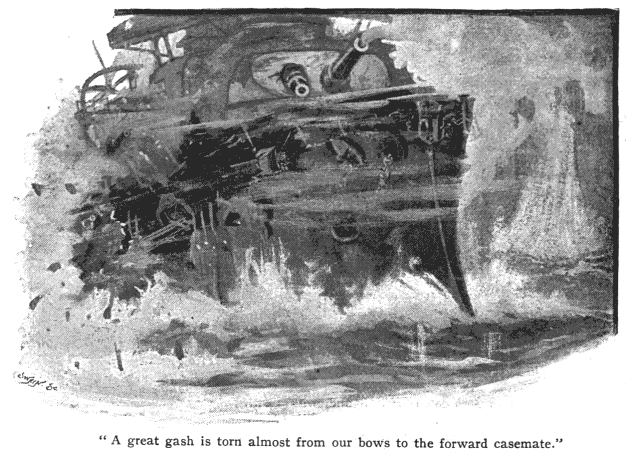
There is nothing for it now but the ram. The bells clang in the engine-room, the engines throb harder, the propellers whirl more and more swiftly, and the ship forges forward. Every gun that can be trained ahead pours its continuous stream of shot and shell on to the devoted but unyielding foe. Her guns, too, reply, but not for long. We are making nearly fifteen knots, and at that speed a few hundred yards are soon covered. So through the storm the great ship ploughs her way, terrible and resistless as Fate itself.
We see two bubbling streams converging along the water towards us. Under each a torpedo loaded with 500 pounds of gun cotton is rushing towards us at thirty knots an hour. If they converge upon us our ram will never touch Leviathan's side, but the chance of war is with us. We shoot in between the two streams, and the torpedoes speed harmlessly away astern. But Leviathan's decks are still a volcano, vomiting a storm of shot, great and small, and into this, with battered top-works and torn decks, we rush to strike the final blow.
Soon comes a dull, smothered crash and a mighty shock, and the huge bulk of the charging ship stops and shudders. Then she forges slowly ahead till her stem bores and grinds its way through the bulwarks and deep into the deck of Leviathan, now stricken to death. For a moment the two are locked in the death-grip; then the reversed engines drag us, jolting and trembling, out of the huge gap that our ram and stem have made. Leviathan's stern goes down; her bows, with the great, dripping, gleaming, cruel-looking ram projecting from them, heave up out of the water till she seems to stand almost on end, and then in the midst of a cloud of steam and smoke she makes her last plunge, and goes down to her death in the depths.
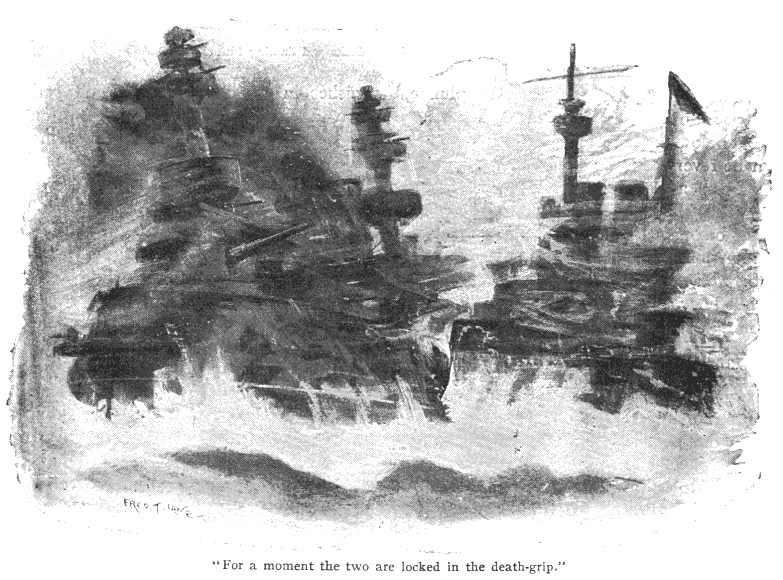
But before the engines can be reversed again we hear a fierce, breathless, panting sound on our quarter. A long, low, narrow black craft, with red decks and flaming funnels, dashes out of a dense cloud of smoke at a speed compared with which our best is a snail's pace. She rushes up to within two hundred yards of us. Two silvery shapes leap from her decks into the shot-churned water. It is a gallant deed, gallantly dared and done in the face of certain destruction.
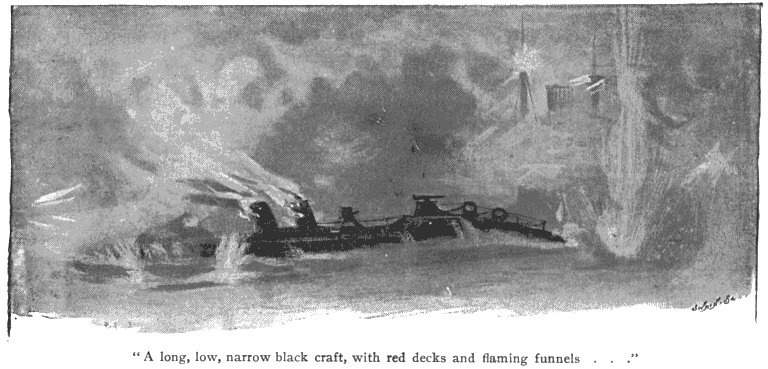
Hardly have the torpedoes dived beneath the waves than a hurricane of flame and smoke aud shot and shell and bullets roars out from our batteries and tops. The torpedo boat crumples up and vanishes in a cloud of steam and smoke. Then a volcano seems to open under us. Two mountains of foam-crowned water tower over us for an instant, and then burst with a thunderous crash over our decks and top-works. Stricken to death, the great ship stops and shudders like a living thing in her last agony. Then, with a sickening reel and swing, she lurches slowly sidewards and sternwards. A chorus of horribly confused sounds comes from the strongholds which are now to be the iron tombs of brave men, and just as the last enemy afloat strikes her flag, H.M.S. Hypothesis — thank God as yet rightly named! — goes down to the grave that shall not be opened till the sea gives up its dead.
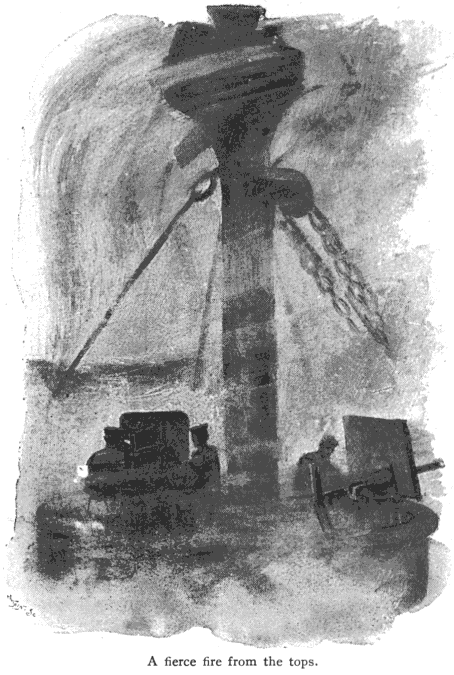
Special thanks to Roger Todd for pointing this article out to me - Marcus L. Rowland